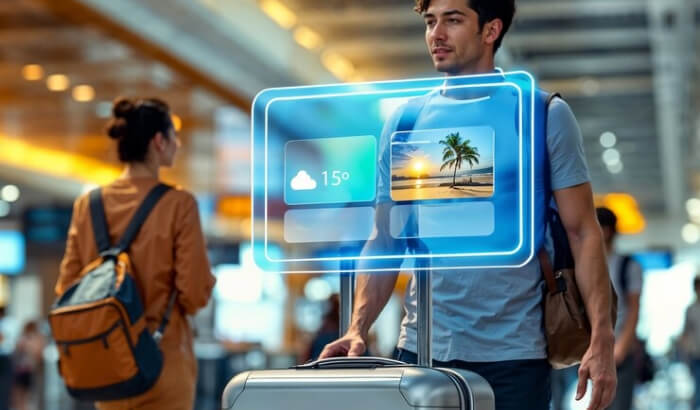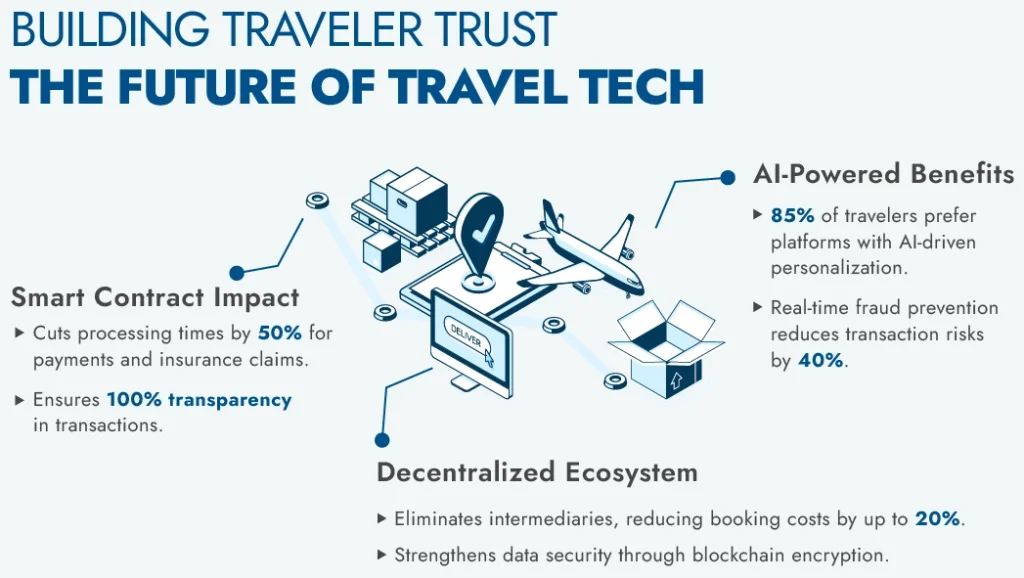
Traditional travel platforms often rely on intermediaries, increasing costs and limiting transparency. Decentralized platforms leverage blockchain technology to eliminate intermediaries, offering travelers direct access to services such as accommodation, transportation, and tour bookings. This shift not only reduces costs but also fosters trust through immutable and transparent transactions.
AI and ML are essential for personalizing the travel journey. From predicting customer preferences to optimizing itineraries, these technologies enhance user experiences by delivering tailored recommendations. For instance, AI-powered chatbots provide real-time assistance, while ML algorithms analyze past bookings to suggest relevant travel packages.


Smart contracts are self-executing agreements with terms directly written into code. Operating on blockchain networks, these contracts automatically execute actions when predefined conditions are met, eliminating the need for intermediaries.

Transparent Transactions: Smart contracts ensure payments are released only when services are delivered as promised, eliminating the risk of fraud.
A traveler books a hotel via a decentralized platform, where the payment is securely held in escrow by a smart contract. Upon check-in, the contract verifies the service's completion and releases the payment automatically, offering both parties peace of mind.
Insurance Claims Automation: Travel insurance claims are often tedious and time-consuming. Smart contracts revolutionize this by automating claims processing.
If a flight is delayed beyond a specified threshold, the smart contract automatically verifies the event from trusted data sources and triggers compensation directly to the traveler, reducing delays and disputes.
Supplier Verification: Ensuring the credibility of service providers is crucial in travel tech. Smart contracts perform real-time verification of vendors' credentials and ratings, allowing only authenticated suppliers to participate in the platform.
A decentralized travel marketplace integrates smart contracts to verify licenses, certifications, and user reviews of a tour operator, ensuring high-quality service delivery while boosting traveler confidence.


One of the most significant benefits of smart contracts is their ability to create transparent ecosystems. Each transaction is recorded on an immutable blockchain ledger, which can be accessed and verified by all relevant parties. This ensures that travelers and service providers have a clear view of every transaction, reducing disputes and building long-term trust.
A traveler booking a package deal can verify that payments are only released upon fulfillment of agreed-upon services, such as accommodations or guided tours.
Smart contracts streamline complex workflows by automating repetitive tasks. This reduces the time and costs associated with manual processes, such as claims processing or payment reconciliation. Travelers benefit from faster services, while businesses enjoy improved resource allocation.
When a traveler cancels a booking within the allowed refund period, the smart contract automatically processes the refund, eliminating delays caused by manual intervention.
With cryptographic protection, smart contracts ensure that all data is securely stored and transactions are tamper-proof. They significantly reduce the risk of fraud and unauthorized access, making them ideal for handling sensitive financial and personal information in the travel industry.
Payment details, traveler preferences, and vendor credentials are securely encrypted, ensuring that even in decentralized systems, data remains private and protected.

AI-powered virtual assistants are transforming customer support by offering instant, accurate responses to traveler queries across multiple channels. These chatbots leverage ML to continually learn from past interactions, improving their contextual understanding and response accuracy. This ensures that travelers receive consistent and helpful support anytime they need it.
A traveler facing a delayed flight can interact with an AI chatbot to instantly explore alternative routes or request compensation, providing peace of mind.
AI systems excel at analyzing vast transaction datasets to identify anomalies and flag suspicious activities in real time. By deploying ML algorithms, decentralized platforms can detect and mitigate fraud before it impacts travelers, ensuring secure transactions and building confidence in the platform.
If a user account shows unusual login attempts from multiple locations, the AI system can flag the activity, notify the user, and temporarily suspend transactions to prevent unauthorized access.
Travel platforms powered by AI can analyze user data, including browsing behavior, preferences, and booking history, to deliver hyper-personalized recommendations. This level of customization enhances user satisfaction and fosters long-term loyalty by providing travelers with tailored suggestions for destinations, accommodations, and experiences.
A frequent solo traveler might receive recommendations for off-the-beaten-path destinations, while a family booking a vacation could see kid-friendly accommodation options and activities.
ML models use predictive analytics to understand demand fluctuations, seasonal trends, and competitor pricing strategies. This enables travel platforms to dynamically adjust pricing, offering competitive rates while maximizing revenue. Such transparency in pricing builds trust by ensuring fair and data-driven pricing strategies.
During a holiday season surge, ML algorithms adjust hotel prices in real time based on demand forecasts, ensuring availability at reasonable rates while maximizing profits for vendors.

Enhanced AI Functionality: Centralized, clean data enables predictive algorithms to provide precise recommendations.
Improved User Experience: Travelers receive accurate, real-time updates across platforms.
Example: A global travel platform uses AI-powered integration to combine flight schedules, hotel availability, and weather data, creating a unified dashboard for personalized trip planning.

Mitigated Risks: Real-time regulatory monitoring minimizes violations.
Trust Building: Transparent operations foster traveler confidence.
Example: A decentralized travel platform uses smart contracts that automatically enforce GDPR-compliant practices, ensuring that sensitive traveler data remains secure and private.

Increased Adoption Rates: Simplified platforms attract a broader audience.
Operational Efficiency: Automated features reduce the need for manual intervention.
Example: A blockchain-based travel app employs a guided onboarding process that uses AI chatbots to explain how smart contracts operate, resulting in a 25% rise in user engagement.

Proactive Planning: Predictive insights allow businesses to anticipate market fluctuations.
Resource Optimization: Streamlined operations reduce waste and enhance profitability.
Example: A travel company leverages ML to predict holiday booking surges, adjusting inventory and staff schedules accordingly, leading to a 30% improvement in service efficiency.


Data Standardization: Implementing frameworks that unify data formats across sources ensures smooth AI operation.
Regulatory Alignment: Tailored solutions help platforms comply with global regulations, such as GDPR, while maintaining operational efficiency.
User-Friendly Interfaces: Simplifying the interaction with blockchain and smart contracts can drive adoption among non-tech-savvy users.
Traveler Behavior Analysis: ML models predict booking patterns, enabling platforms to anticipate demand and tailor offerings accordingly.
Operational Efficiency: AI optimizes backend operations, such as inventory management and supplier coordination, ensuring seamless service delivery.


| Cookie | Duration | Description |
|---|---|---|
| __cf_bm | 1 hour | This cookie, set by Cloudflare, is used to support Cloudflare Bot Management. |
| _cfuvid | session | Calendly sets this cookie to track users across sessions to optimize user experience by maintaining session consistency and providing personalized services |
| cookielawinfo-checkbox-advertisement | 1 year | Set by the GDPR Cookie Consent plugin, this cookie records the user consent for the cookies in the "Advertisement" category. |
| cookielawinfo-checkbox-analytics | 11 months | This cookie is set by GDPR Cookie Consent plugin. The cookie is used to store the user consent for the cookies in the category "Analytics". |
| cookielawinfo-checkbox-functional | 11 months | The cookie is set by GDPR cookie consent to record the user consent for the cookies in the category "Functional". |
| cookielawinfo-checkbox-necessary | 11 months | This cookie is set by GDPR Cookie Consent plugin. The cookies is used to store the user consent for the cookies in the category "Necessary". |
| cookielawinfo-checkbox-others | 11 months | This cookie is set by GDPR Cookie Consent plugin. The cookie is used to store the user consent for the cookies in the category "Other. |
| cookielawinfo-checkbox-performance | 11 months | This cookie is set by GDPR Cookie Consent plugin. The cookie is used to store the user consent for the cookies in the category "Performance". |
| CookieLawInfoConsent | 1 year | CookieYes sets this cookie to record the default button state of the corresponding category and the status of CCPA. It works only in coordination with the primary cookie. |
| viewed_cookie_policy | 11 months | The cookie is set by the GDPR Cookie Consent plugin and is used to store whether or not user has consented to the use of cookies. It does not store any personal data. |
| wpEmojiSettingsSupports | session | WordPress sets this cookie when a user interacts with emojis on a WordPress site. It helps determine if the user's browser can display emojis properly. |
| Cookie | Duration | Description |
|---|---|---|
| li_gc | 6 months | Linkedin set this cookie for storing visitor's consent regarding using cookies for non-essential purposes. |
| lidc | 1 day | LinkedIn sets the lidc cookie to facilitate data center selection. |
| wp-wpml_current_language | session | WordPress multilingual plugin sets this cookie to store the current language/language settings. |
| yt-remote-cast-installed | session | The yt-remote-cast-installed cookie is used to store the user's video player preferences using embedded YouTube video. |
| yt-remote-connected-devices | never | YouTube sets this cookie to store the user's video preferences using embedded YouTube videos. |
| yt-remote-device-id | never | YouTube sets this cookie to store the user's video preferences using embedded YouTube videos. |
| yt-remote-fast-check-period | session | The yt-remote-fast-check-period cookie is used by YouTube to store the user's video player preferences for embedded YouTube videos. |
| yt-remote-session-app | session | The yt-remote-session-app cookie is used by YouTube to store user preferences and information about the interface of the embedded YouTube video player. |
| yt-remote-session-name | session | The yt-remote-session-name cookie is used by YouTube to store the user's video player preferences using embedded YouTube video. |
| ytidb::LAST_RESULT_ENTRY_KEY | never | The cookie ytidb::LAST_RESULT_ENTRY_KEY is used by YouTube to store the last search result entry that was clicked by the user. This information is used to improve the user experience by providing more relevant search results in the future. |
| Cookie | Duration | Description |
|---|---|---|
| _ga | 1 year 1 month 4 days | Google Analytics sets this cookie to calculate visitor, session and campaign data and track site usage for the site's analytics report. The cookie stores information anonymously and assigns a randomly generated number to recognise unique visitors. |
| _ga_* | 1 year 1 month 4 days | Google Analytics sets this cookie to store and count page views. |
| _gcl_au | 3 months | Google Tag Manager sets the cookie to experiment advertisement efficiency of websites using their services. |
| _li_id | 2 year | Leadinfo places two cookies that only provides Eastern Enterprise insights into the behaviour on the website. These cookies will not be shared with other parties. |
| Cookie | Duration | Description |
|---|---|---|
| bcookie | 1 year | LinkedIn sets this cookie from LinkedIn share buttons and ad tags to recognize browser IDs. |
| guest_id | 1 year 1 month | Twitter sets this cookie to identify and track the website visitor. It registers if a user is signed in to the Twitter platform and collects information about ad preferences. |
| test_cookie | 15 minutes | doubleclick.net sets this cookie to determine if the user's browser supports cookies. |
| VISITOR_INFO1_LIVE | 6 months | YouTube sets this cookie to measure bandwidth, determining whether the user gets the new or old player interface. |
| VISITOR_PRIVACY_METADATA | 6 months | YouTube sets this cookie to store the user's cookie consent state for the current domain. |
| YSC | session | Youtube sets this cookie to track the views of embedded videos on Youtube pages. |
| yt.innertube::nextId | never | YouTube sets this cookie to register a unique ID to store data on what videos from YouTube the user has seen. |
| yt.innertube::requests | never | YouTube sets this cookie to register a unique ID to store data on what videos from YouTube the user has seen. |
| Cookie | Duration | Description |
|---|---|---|
| __Secure-ROLLOUT_TOKEN | 6 months | Description is currently not available. |
